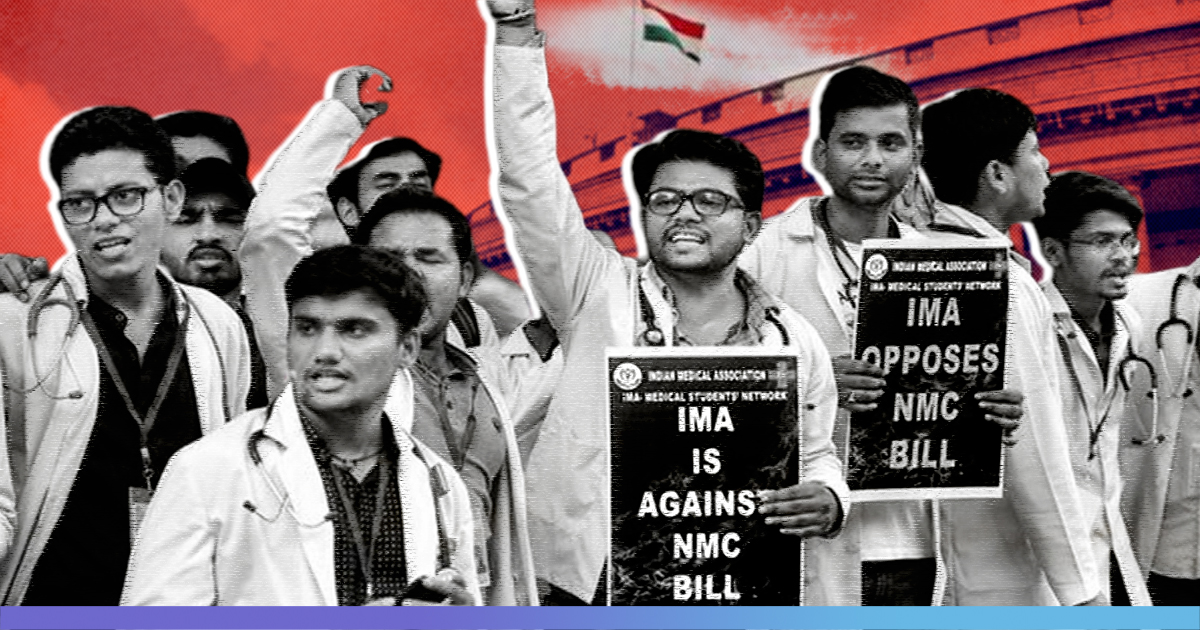On July 29, the Lok Sabha passed the contentious National Medical Commission Bill, 2019, calling it one of the most significant reforms that will end ‘inspector raj’ in the medical education sector.
The bill proposes to revoke the Indian Medical Council Act, 1956 and establish an NMC in place of the Medical Council Of India which was dissolved in 2010 following corruption charges against the MCI President Ketan Desai by the Central Bureau Of Investigation.
IMA Calls For Protest
The bill received flak in Lok Sabha, and more than 5000 doctors took to the streets to protest against the bill. The medical fraternity also burnt thousands of copies of the bill across the nation.
The Indian Medical Association (IMA) has claimed that replacing the MCI with another body will give birth to new forms of corruption.
The IMA also claimed that Section 32 of the NMC Bill provides for licensing of 3.5 lakhs unqualified non-medical persons to practice modern medicine.
“Licenses to practice modern medicine to Ayurveda, Unani and Homeopathy doctors are going to bring down the quality of medical care. If they genuinely want to increase the number of medical care providers, they should increase the MBBS seats and also regulate private colleges that take a huge amount of donation for seats,” a practicing doctor in the Army told The Logical Indian.
The bill was earlier referred to a parliamentary select committee after more than 5,000 doctors, and healthcare professionals joined the IMA’s call for protests from across the country against the NMC bill.
Opposition’s Take
The bill was successfully passed with a 260-48 voice vote, amid a walkout by the Congress, Dravida Munnetra Kazhagam and the Trinamool Congress.
Many amendments suggested by the Opposition were rejected. “As the government is not keen on passing any amendment suggested by us, we are walking out as we oppose it tooth and nail,” said Adhir Ranjan Chowdhury, the leader of the Congress party in Lok Sabha.
The proposed NMC Bill will approve the medical colleges and institutions, conduct common MBBS entrance and exit examinations and also regulate course fees.
The bill proposes a common final year MBBS examination, the National Exit Test (NEXT) before an individual starts practicing medicine and for getting admission to any post-graduate medical courses. The NMC will also hold a screening test for foreign medical graduates.
Vardhan said, no medical college will be set up without the state government’s permission. The government of India will have no role in the day-to-day running of the medical colleges, Vardhan added.
“Yearly inspections have been done away with. The Bill seeks to put in place a new structure to tackle challenges in the medical education sector and is a pro-poor,” Vardhan added.
“By bringing the bill, the basic intention of the government is to ensure and restore the utmost standard of integrity in medical education. This will also end the inspector raj in the system,” Harsh Vardhan said in Lok Sabha.
The legislation is “pro-poor” and would bring government seats and 50% of all private seats within reach of meritorious students belonging to economically weaker sections of society, he added.
Bill Receives Nationwide Criticism
From the opposition, DMK leader A. Raja said the bill is “anti-poor, anti-social justice, undemocratic and anti-federalism”. He also said that it would encourage corruption and nepotism in the medical profession.
Trinamool Congress member Kakoli Ghosh Dastidar, too, said the bill is against the basic principle of federalism and would jeopardise the future of students. “The exit exam would put undue pressure on students. This is unwarranted and a shame,” she said in the Lok Sabha.
“It is like throwing the baby out with the bathwater; the cure seems to be worst than the disease,” Congress’ Manish Tewari said during the debate.
IMA Calls Bill ‘Undemocratic’
The IMA has been alleging that the bill is “anti-poor and anti-students” since 2017 when it was first tabled in the Parliament. The IMA also criticises many provisions in the bill, including the merging of NEXT with the National Eligibility cum Entrance Test, besides regulation of fees for 50% seats in private medical colleges and deemed universities.
“The Lower House on Monday dumped healthcare & medical education of this country into darkness by approving undemocratic Bill,” said the IMA.
Also, Read Cabinet Clears Bill To Replace The 63-Year-Old Medical Council Of India











